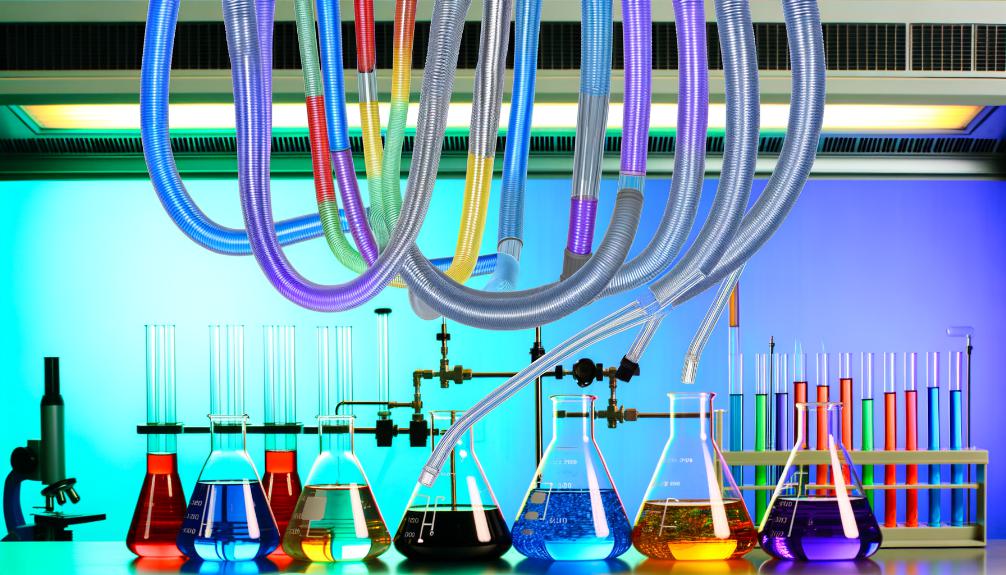
Chemical resistant flexible hoses are essential for your operations across various industries. In chemical processing, they withstand harsh chemicals and extreme temperatures, ensuring material safety and system integrity. You'll find these hoses indispensable in pharmaceutical manufacturing, where they prevent contamination during critical sterile processes and support the maintenance of a sterile environment. Additionally, in waste management, these hoses safely transport hazardous chemicals, preventing environmental contamination and supporting system efficiency. Each application relies on the hose's ability to resist corrosion and degradation, enhancing operational safety and compliance. Further exploration will reveal additional insights into optimizing these applications.
Chemical Processing Industry Uses
In the chemical processing industry, flexible hoses stand up to harsh chemicals and extreme temperatures, guaranteeing safe and efficient material transfer. You'll find that material compatibility is essential, as the hoses must resist corrosion, permeation, and degradation by a wide range of chemicals. Selecting the right hose material—whether it's PTFE, FEP, or PVC—is vital to prevent contamination and maintain the integrity of the process fluid.
Safety protocols in this situation are rigorous. You're required to adhere to stringent standards to make sure that all hose assemblies are capable of withstanding the operational pressures and temperatures without failure. Regular inspections and maintenance are compulsory to prevent hazardous leaks and ruptures. The integration of break-away couplings and dry disconnect fittings enhances safety by minimizing spillage during disconnection and providing a rapid means of decoupling in emergency situations.
Each hose application demands careful consideration of factors such as the chemical properties of the fluids, operational temperature ranges, and the physical layout of the processing facility. The use of proper fittings, adherence to installation guidelines, and routine pressure tests contribute significantly to operational safety and efficiency. Therefore, the careful selection and management of flexible hoses are critical to maintaining a safe and productive chemical processing environment.
Pharmaceutical Manufacturing Applications
Similarly, the pharmaceutical manufacturing industry depends on chemical resistant flexible hoses to guarantee the purity and quality of its products. In your cleanroom operations, these hoses are essential for maintaining a contaminant-free environment. They're designed to withstand harsh sterilization processes, ensuring that no residues compromise your sterile transfer procedures.
The hoses' chemical resistance is important because it prevents the leaching of harmful substances into critical pharmaceutical ingredients. This characteristic is particularly significant during the production of injectables and biologics, where even minute contaminants can affect the efficacy and safety of the final product.
Here's a breakdown of their roles in pharmaceutical manufacturing:
| Application | Importance |
|---|---|
| Material Transfer | Ensures purity during the movement of sensitive liquids. |
| Sterile Filtration | Prevents contamination during filtration processes. |
| Process Equipment Interfaces | Facilitates secure connections, minimizing leaks. |
| Cleanroom Operations | Supports the maintenance of a sterile environment. |
You'll find that integrating these hoses into your systems not only enhances operational efficiency but also reinforces compliance with stringent regulatory standards. Their robust design ensures durability and reliability, pivotal for continuous, demanding pharmaceutical production cycles.
Waste Management Systems
Chemical resistant flexible hoses play an essential role in waste management systems by ensuring the safe and efficient transport of hazardous chemicals without contamination or leakage. When you're dealing with the complexities of hazardous liquid transport, it's important that the materials used can withstand aggressive chemicals and extreme conditions. These hoses are designed to resist the corrosive nature of various waste products, thereby preserving the integrity of your handling system and preventing environmental contamination.
In the domain of effluent treatment efficiency, these hoses contribute greatly. They facilitate the secure movement of effluents from one treatment stage to another, minimizing the risk of leaks and exposure. This is particularly important in systems where the accidental release of hazardous materials could have severe consequences for both public health and the environment.
Furthermore, the adaptability of these hoses allows for installation in intricate configurations often required in waste management facilities. Their flexibility helps maintain continuous operations, even under varying pressure conditions and in tight spaces, enhancing overall system reliability.
You'll find that investing in quality chemical resistant hoses not only supports compliance with stringent environmental regulations but also optimizes the operational lifespan of your waste management infrastructure.
Conclusion
To sum up, you'll find chemical resistant flexible hoses indispensable across various sectors. In chemical processing, they handle corrosive materials safely, enhancing operational integrity.
Within pharmaceutical manufacturing, their use guarantees purity and compliance with stringent regulatory standards.
Finally, in waste management, these hoses resist harsh chemicals, preventing leaks and environmental contamination.
Each application not only demands specific hose qualities but also highlights the critical role these components play in maintaining safety and efficiency in challenging environments.
© Copyright 2024. All RIghts Reserved
